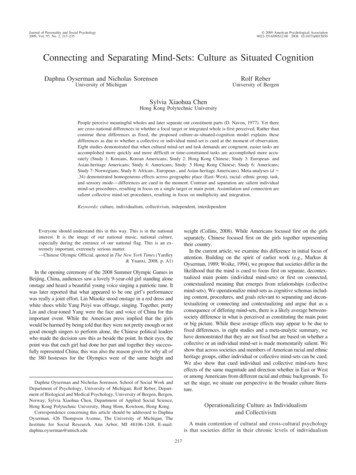
Transcription
A Mind Guide to Parkinson’s Disease200 SE 1st Street, Suite 800Miami, Florida 331311359 Broadway, Suite 1509New York, New York 10018helpline:800. 4PD.INFO (473.4636)helpline@parkinson.orgparkinson. org
About the Parkinson’s FoundationThe Parkinson’s Foundation makes life better for people with Parkinson’sdisease by improving care and advancing research toward a cure.In everything we do, we build on the energy, experience and passionof our global Parkinson’s community. A wealth of information aboutParkinson’s and about our activities and resources is available on ourwebsite, Parkinson.org.Your feedback matters!We’d like to know what you think of our publications and programs.Please take a few moments to fill out our online feedback form.Your answers will be used to improve our resources and will benefitpeople with Parkinson’s, caregivers, families and others in theParkinson’s community. Thank you for your help.Online form:About this bookGlossaryDefinitions for all words underlined in blue canbe found in the glossary starting on page 32.A comprehensive Parkinson’s disease glossarycan be found at Parkinson.org/glossary.IndexAn index of key words and topics can be foundon page 36.parkinson’s foundation resourcesCertain pages include tip sheets with practicalpointers for managing Parkinson’s diseaseassociated psychosis. You can find more helpfultips for managing Parkinson’s disease-associatedpsychosis in the books, fact sheets, videos andnewsletters in our PD library at Parkinson.org/library.Parkinson.org/feedbackYour generosity makes this publication possible.The Parkinson’s Foundation is proud to provide this booklet and othereducational materials at no cost to people around the globe. If you foundthis book helpful, please consider a gift so that we may continue to fightParkinson’s on all fronts: funding innovative research, providing supportservices and offering educational materials such as this publication.Thank you for your support.Donate online:Parkinson.org/donateDonate by mail: Parkinson’s Foundation200 SE 1st St, Suite 800Miami, FL 33131Donate by phone:1-800-4PD-INFO (473-4636)Tax ID:13-1866796The information contained in this publication is provided for informational and educationalpurposes only and should not be construed to be a diagnosis, treatment, regimen or anyother healthcare advice or instruction. The reader should seek his or her own medical orother professional advice, which this publication is not intended to replace or supplement.The Parkinson’s Foundation disclaims any responsibility and liability of any kind inconnection with the reader,s use of the information contained herein. 2018
1Psychosis can be a frightening word that many peopleassociate with movies or the news, or simply don’tunderstand. But what does it really mean? In Parkinson’sdisease (PD), what your doctor calls psychosis usuallystarts with mild symptoms, but these can have abig impact on quality of life. This book explains whatParkinson’s psychosis is, why people with Parkinson’smight experience symptoms of psychosis, and how totreat it and cope with it.About 20% of all people with PD will experience some form ofhallucinations or delusions, and the number increases the longer you livewith the disease. About 70% of people who have lived with Parkinson’sfor 20 years or more will experience psychosis. The information, tips, andstories included here will provide answers, help you organize thoughts andquestions for your medical team, and remind you that you are not aloneon this Parkinson’s journey. Some of the tips in this book are for caregiversof someone experiencing Parkinson’s disease psychosis, but people withParkinson’s will also learn a great deal about the condition from thosesuggestions for dealing with it.
2ContentsAboutParkinson’sDisease5What Is PDPsychosis?7Talkingabout PD& Psychosis23Tips forCaregivers25
3Causes13Treatments17Glossary 32Index 36Summary31
AcknowledgementsThis book was written and reviewed by:Linda Minton, MPHKate Perepezko, MSPHGregory Pontone, MDThis book has been made possible through thegenerous donations of thousands of individualsaffected by Parkinson’s and a grant fromDesign: Ultravirgo
5chapter oneAbout Parkinson’sDiseaseIf you’re reading this book, you are probably alreadyfamiliar with Parkinson’s disease, but here are some basics:Parkinson’s is a progressive neurodegenerative disorderthat affects about one million people in the United Statesand 10 million people worldwide. It is called a movementdisorder because of the tremors, slow movements, stiffnessand muscle cramping it can cause. But its symptoms arediverse and usually develop slowly over time.Parkinson’s disease is not diagnosed with a test or a scan; instead it isdiagnosed by your doctor, who asks you questions about your health andmedical history and observes your movement. Your doctor may want youto have some test or imaging; some, like an MRI, can help rule out otherconditions, while others, like DaTScan, may help confirm a Parkinson’sdiagnosis if there is uncertainty. The goal of treatment is to help youmanage your symptoms. Good symptom management can help youto stay healthy, exercise and keep yourself in the best possible shape.Although at this time there is no way to correct the brain changes thatcause Parkinson’s, we know that exercise can help you maintain your abilityto fight the disease and that staying healthy can reduce setbacks that makePD progress faster. Great care is key to living your best life with Parkinson’s.
6psychosisLack of dopamine in people with Parkinson’s was first described in the1960s. Dopamine is a neurotransmitter, or chemical messenger, one ofseveral chemicals your brain cells use to send signals to one another.Soon after, dopamine-replacement therapy using levodopa became –and remains – the gold standard treatment. However, we know that thedopamine system is not the only one affected by Parkinson’s. The diseaseprocess also disrupts other brain networks, including those linked to mood,behavior and thinking (cognition). You might also hear that Parkinson’s islinked to a protein in the human brain called alpha-synuclein. Researcherscontinue to study how cells and brain networks are affected in Parkinson’sto improve our understanding of the disease and potential for treatments.You and your family may have questions or fears about Parkinson’s andgenetics. While there are several genetic mutations that can increase yourrisk, for the vast majority of people, Parkinson’s is not inherited. There isno test that can accurately predict who will develop Parkinson’s. Extensivegene and biomarker research is underway to uncover the possible factorsinvolved in – not necessarily causes of – disease development.What Does “Psychosis” Mean?The word “psychosis” has a long history, with roots in Latin and Greek.Across history, the meaning of the word has evolved, but from the 1800son it has been used as we understand it today: to refer to a break withreality. This break from reality can range from severe confusion(disordered thinking) to seeing things that aren’t there (hallucinations)to believing things that are not true (delusions). Psychosis in otherconditions, such as schizophrenia, can include many symptoms thatare rare in people with Parkinson’s.
7chapter twoWhat IsPD Psychosis?When most people think of Parkinson’s, they think oftremors, stiffness or slowness of movement. Manypeople are unaware that PD can affect thinking, moodand behavior, among other changes. For people withParkinson’s and their caregivers, living with the motorsymptoms can be hard, but behavior changes can be evenmore frustrating and challenging, and these changescan have a huge impact on quality of life. No two peoplewith Parkinson’s are the same, and most people do notdevelop every symptom. However, about 20% of all peoplewith PD will experience some form of hallucinations ordelusions, and the number increases the longer you livewith the disease. About 70% of people who have lived withParkinson’s 20 years or more will experience psychosis.This can be particularly frightening if you don’t know whatis happening, so it is important to be able to recognize thesymptoms if they happen to you or a loved one. Healthcareproviders usually refer to these symptoms as “Parkinson’sdisease-associated psychosis.”
8psychosisHistory of Psychosis in PD180018501900The first description of Parkinson’s disease occurred in1817 in James Parkinson’s “An Essay on the Shaking Palsy.”Decades later, the neurologist William Gowers noted thatpsychotic symptoms were occasionally seen in PD, buthe did not think they were directly associated with thepathological process of Parkinson’s. As time went on, theconnection between PD and psychosis became clearer.Between 1880 and 1920, several psychiatrists reportedhallucinations among their PD patients, and the previousbelief that “mental disturbances” in PD were completelyseparate from the disease was rejected.Later, focus on the psychotic symptoms in PD increasedas many survivors of the 1920s encephalitis epidemicpresented with Parkinsonisms and mental disturbances.1950Since the 1960s, we have seen PD-associated psychosisprevalence increase as dopamine-replacement therapy hasbeen used to control motor symptoms.In the 1970s, researchers noted that treatment with levodopacould exacerbate or cause psychotic symptoms and thatlowering doses of levodopa could sometimes resolve them.2000In the 1990s, researchers found that several antipsychoticdrugs could be used to treat PD-associated psychosis,including clozapine and quetiapine.In 2016, the FDA approved the first drug specifically designedto treat Parkinson’s disease psychosis (pimavanserin).
what is PD psychosis?9Understanding PsychosisMany people are not aware that hallucinations are a possibility in theParkinson’s progression, so the surprise and fear associated with thesenew symptoms can be magnified.Not everyone will get Parkinson’s disease-associated psychosis, butawareness and understanding of the cause(s) and symptoms can helpwith early and appropriate diagnosis and treatment.Psychosis can be defined in two ways: A symptom of a medical condition characterizedby a loss of contact with reality; or A psychiatric disorder that produces psychotic symptoms.Parkinson’s disease psychosis is generally the former: in the majority of PDcases, psychosis occurs as a side effect of the disease and medications.Sometimes, in mid- to late-stage Parkinson’s, hallucinations, illusions anddelusions may appear as neurologists try to find the right combination ofmedications to reduce the impact of PD motor symptoms. These shouldnot immediately be considered a new psychiatric illness. Instead, talkto your doctor about the potential causes of and treatments for thesesymptoms in the context of Parkinson’s disease. Some questions to thinkabout to prepare for a conversation with your doctor are on page 19.NOTEHallucinations and delusions can be caused by medications andby the same brain changes that cause Parkinson’s disease itself.(Turn to Chapter 3, “Causes,” on page 13 for more information.)It is important to keep your medical team informed about anysymptoms, so they can be effectively managed.
10 psychosisWhat Are Hallucinations?The term “hallucination” describes something you see, hear, smell,taste or feel that is not actually there. Hallucinations are not dreams ornightmares. They happen when you are awake and can occur at any timeof day or night.Hallucinations are best understood as deceptions – tricks the brain playson the body’s five senses. Hallucinations in people with Parkinson’s aregenerally visual. Common hallucinations include seeing people or animals.While the visions appear real to the person experiencing them, they cannotbe seen by anyone else. These “visitors” are generally out of place andmight cause concern, though they are not always distressing.Auditory hallucinations – when you hear sounds or voices that aren’t real –are less common in people with Parkinson’s. Other kinds of hallucinationscan be felt (tactile), smelled (olfactory) or tasted (gustatory), but they areeven less common in Parkinson’s disease-associated psychosis.When hallucinations first appear in people with Parkinson’s, you mightrecognize that what you are seeing (or hearing, etc.) isn’t real. This is called“retaining insight.” Insight allows you to understand that the hallucinationsare a symptom of Parkinson’s rather than a new reality. You might be ableto create coping mechanisms to help you through the experience. Havinginsight is common in several psychiatric conditions, though it is morecommon in illusions than in hallucinations. For example:Eleanor was sitting with her friend Margaret one morning at herhouse. She noticed a dog walking around her couch, sniffing theground. Eleanor asked Margaret when she got the dog. Margaretreplied that she didn’t own a dog and that there wasn’t a dog in theroom. Eleanor realized she must be experiencing what her doctor hadwarned her about – a hallucination. Margaret asked Eleanor if shehad been feeling well. Eleanor said that her doctor had just increasedher Parkinson’s medications and that she had noticed some visualchanges recently. She decided to call her doctor that afternoon toinform him of the hallucination.Any hallucination, whether or not it is bothersome, should be reported tocaregivers and the medical team. If you can discuss or explain what you aregoing through, it can help you receive prompt and appropriate treatment.It may also reduce conflict with caregivers and family members.
what is PD psychosis? 11When people lose insight they begin to believe that the hallucinations arereal. When this happens, the person with Parkinson’s might try to interactwith the imaginary people or objects. This may cause behavior changesin the person with Parkinson’s, including agitation or aggression. Hallucinations without insight pose a greater risk of harm to oneself and thosearound you, even if the hallucinations are not distressing. For example:Christopher would see parades of beautiful wooden puppets marchingin front of him. He enjoyed watching the parades and would watchthem for hours. One day as the parade was passing in front of him,he tried to step over it, not wanting to interfere with the marchingpuppets. Unfortunately, he lost his balance while trying to avoidstepping on the puppets and fell, breaking his hip in the process.He spoke to his brother, Patrick, about this accident. Patrick toldhim they should tell the doctor about the hallucinations.What Are Illusions?Illusions are another sensory misperception. Instead of seeing thingsthat are not there (hallucinations), people with illusions misinterpret realexternal stimuli. In other words, they see or hear something wrong, such asmistaking hats on a coat rack for heads, or hearing a chant instead of theair conditioner. For example:Drew noticed his wife, Nora, speaking in whispered tones andgesticulating to some hanging plants in their home. When he askedwith whom she was speaking, Nora replied that she was talking tothe green heads. Drew advised Nora that there were no heads, onlyhanging plants that could not talk back to her. She accepted thiswillingly and moved on with her day. However, later on she continuedspeaking to the hanging plants.Illusions can also be experienced as a “sense of presence” – when you havethe feeling of a person or animal being nearby when there is no one around– or as “passage hallucinations” – when an unformed object moves in yourperipheral vision.tipIllusions and hallucinations are more likely to occur in low light/lowvisibility situations. To reduce risk, increase lighting, particularly indark areas such as hallways.
12 psychosisWhat Are Delusions?Delusions are false, fixed, idiosyncratic beliefs. They are not deliberate,cannot be controlled and are very real to the person with Parkinson’s.Delusions are ongoing and can be subtle. They often begin as generalizedconfusion at night and progress from there.You may never experience delusions – fewer than 10% of people withParkinson’s do – but knowing they are a possibility can help in futureplanning. In PD-associated psychosis, delusions occur less frequentlythan hallucinations and are generally more difficult to treat. They can beassociated with medications as well as a general deterioration in condition.There are three general categories of delusions that come up in Parkinson’sdisease psychosis:– Jealous (when you believe your significant other is unfaithful)– Persecutory (when you believe harm is occurring or going to occur)– Somatic (realted to bodily functioning or sensations,or physical appearance)Paranoia – when you become suspicious – is a common type of delusion.Paranoia often involves accusations of marital infidelity or fear of beingpoisoned by medications or food.NOTEDelusional thoughts are not deliberate. They cannot be controlled,and the person with Parkinson’s cannot be talked out of believing them.
13chapter threeCausesParkinson’s disease-associated psychosis, like Parkinson’sdisease itself, is caused by chemical changes in thebrain. Dopamine is a neurotransmitter that is primarilyresponsible for controlling movement, emotional responsesand the ability to feel pleasure and pain. In people withParkinson’s, the cells that make dopamine can be impairedor die. Without these cells, there is less available dopamine.With lower levels of dopamine, you experience the motorsymptoms of PD.On the other hand, abnormally high levels of dopaminecause hallucinations and delusions. This increase indopamine is usually related to the medications prescribedto relieve motor symptoms. It can be a challengingbalancing act to provide enough dopamine to controlthe motor symptoms of PD without providing too muchdopamine so that the person with Parkinson’s begins tohave hallucinations and delusions.
14 psychosisThere are three main contributors to the developmentof Parkinson’s disease-associated psychosis:1. MEDICATION The most common trigger of PD psychosis is medication. The treatment of PD includes drug therapy to regulate dopaminelevels in the brain. As you have likely experienced, finding the perfectmedication regimen can be a painstaking process, and it requires adelicate balance. The treatment objective is to minimize symptoms andmaximize quality of life. However, adjusting neurotransmitter levelschanges the chemical balance of the brain, so people with Parkinson’sbecome at-risk for emotional and behavioral changes. Different types of medications can lead to these disruptions:1) Medications that increase the level of available dopamine. This includesdopamine replacement therapies, such as levodopa converted todopamine in the brain (e.g., Sinemet) and dopamine agonists. 2) Medications that reduce the level of the neurotransmitteracetylcholine, e.g., anticholinergics, which are typically themain ingredient in over-the-counter sleep aids and manyallergy medications.2. DEMENTIA To many people, one of the most worrisome aspects ofaging and neurological disease is the looming risk of cognitive change,when thinking slows, memory fails and it gets harder to make the rightdecisions. Over time, some people progress from normal cognition tomild cognitive impairment – when thinking changes start to have animpact on your life – and then to dementia. Dementia is not a specificdisease; rather, the term describes a group of symptoms associatedwith a decline in memory and thinking. It is commonly associated withcertain medical conditions, such as Alzheimer’s disease, but people withParkinson’s can also develop dementia. Parkinson’s disease dementiaaffects attention, recent memory, executive function and visual andspatial relations. It usually develops years after the PD diagnosis. Having PD dementia does not mean you also have Alzheimer’s.Similarly, when psychosis and dementia occur together and presentearly in the illness (before or within one year of noticing motorsymptoms of PD), an alternate diagnosis of dementia with Lewybodies should be considered. The brain chemistry is similar toParkinson’s disease dementia, but treatment may be different.A consultation with your doctor will help to determine if you havedementia, and what type of dementia you have.
causeS 15tipFor more information on cognitive issues, including dementia, order thebook Cognition: A Mind Guide to Parkinson’s by calling our Helpline at1-800-4PD-INFO (473-4636) or online at Parkinson.org/books.3. DELIRIUM Delirium is a reversible medical condition that generallycomes on and resolves quickly with treatment. It involves a stateof altered alertness, disorganized thinking, unusual behavior and/orhallucinations. Because of these widespread symptoms, deliriumcan be hard to differentiate from other psychiatric conditions.Common causes include infections (e.g., urinary tract infection),heart or liver disease, chemical imbalance and a host of othercommon maladies. In addition to medical conditions and changes,many commonly used medications and substances can cause delirium(e.g., alcohol, anticholinergics like Benadryl, opiate pain medications,benzodiazepines like Xanax or non-steroidal anti-inflammatorydrugs/NSAIDs like aspirin). Something as simple as taking an allergymedication may trigger a change in mental status. Aging and disease progression may change the way you metabolizemedications and alcohol, so things that had no effect on youbefore might lead to big changes now. Delirium in people withParkinson’s doesn’t occur regularly. It can disappear quickly whenthe underlying medical condition (infection, etc.) is resolved andmight never occur again.NOTEIf the person with Parkinson’s is suddenly and unexpectedly confusedor disoriented, contact your doctor or go to a local emergency room.Don’t panic. The problem can usually be resolved once the medical teamidentifies and addresses the trigger. Check your Parkinson’s FoundationAware in Care kit for contraindicated medications and be sure to haveyour updated medication list with you. See page 21 for more informationon the kit and how to order your own.
16 psychosisTip SheetRisk Factors for Psychosis in People with Parkinson’sNot everyone with Parkinson’s will develop hallucinations or delusions,but there are several things that can increase your risk. You and yourcaregiver(s) should be aware of the risk factors below and report anychanges you experience to your medical team.Medications New medications Changes in existing medications (e.g., a change in your Sinemet dose) Use of over-the-counter (OTC) medications like Benadryl, aspirin or ibuprofenDementiaPeople who experience severe decline in memory and thinking are alsomore likely to develop psychosis.Sleep disorder REM behavior disorder Vivid dreaming Sleep apnea Sleep interruptionsIf you are affected by one or more of the above sleep disturbances,you may be at greater risk for psychosis.Vision problems Parkinson’s can cause changes to a person’s vision,making it difficult to distinguish objects. Therefore, people with Parkinson’smay need more light to see well. Some people experience double and/or blurred vision. These changes may increase your risk for hallucinationsor illusions.Hearing problems Like vision problems, hearing impairment should beaddressed, as it increases the risk of auditory hallucinations.Age Older people are more likely to be affected by hallucinations and/or delusions due to visual difficulties that occur with normal aging(e.g., blurred vision, loss of peripheral vision and problems with depthperception).Disease progression As Parkinson’s advances, motor and non-motorsymptoms alike begin to have a greater impact on quality of life. As part ofthis progression, there is also an increased chance of developing psychosis.As with many symptoms, some people will experience psychosis and otherswill not. Being aware of the warning signs and risk factors willhelp you to be prepared.
17chapter fourTreatmentsWho can help manage Parkinson’s diseaseassociated psychosis?Neurologist – Can make adjustments to your Parkinson’s disease medications.Primary care doctor – Can treat causes of delirium (e.g., infection).Psychiatrist – Can prescribe additional medications (e.g., an antipsychoticthat is safe for people with PD) if other attempts to control psychosisare unsuccessful.Counselor – Can talk to you and your family about coping strategies.Support group – A safe place to talk to others with similar experiences.Caregiver – Can help you keep track of changing symptoms, medicationsand behaviors.Person with Parkinson’s disease – You can advocate for yourself!Talk to your family, friends, and healthcare team when you notice changes.
18 psychosisPreparing for a Medical AppointmentAt each visit, your medical team will try to assess any changes to yourhealth. Part of the evaluation might include asking about the presence ofhallucinations or other strange ideas. If you are experiencing these, youshould tell your medical team right away. Don’t wait to be asked. Manypeople do not reveal these experiences to their family or medical teambecause they are not sure what is going on, or they are embarrassed.However, it is important to be honest with your care team, so they can helpmanage symptoms and suggest coping strategies for both the person withParkinson’s and the caregiver. Even hallucinations that are not distressingshould be shared. All care decisions should be made with as muchinformation as possible.Everyone – not only people with Parkinson’s – should bring a companionwith us to important medical appointments. It helps for the primarycaregiver, or other caregiver as needed, to be present to be supportiveand take notes, but also to ask questions and share information. This isparticularly important when the person with Parkinson’s is experiencinghallucinations or delusions and may lack insight into the psychoses.Caregivers have likely noticed (and been affected by) changes in a lovedone’s behavior, so it is essential to report these changes to the medicalteam, whether or not they ask about it.NOTEResearchers used data from the Parkinson’s Foundation’s Parkinson’sOutcomes Project, the largest-ever clinical study of Parkinson’s, tolook at how the use of antipsychotic medication relates to health-relatedquality of life in people with PD. They found that, for patients in thestudy, antipsychotic medications worked. People who were strugglingwith psychosis reported improvement in their status when they startedtaking one.
treatments 19Knowing when the symptoms started, as well as any changes in the healthor medications of the person with Parkinson’s, can help the care teamunderstand what is happening and develop a plan of action. Be preparedwith answers to the following questions: When did you first experience hallucinations/delusions? Have there been any recent changes to your medication regimen?Have you started taking a new medication, or have there been anychanges in dose or timing of the medications you are currently taking? Have you experienced any recent changes in health(e.g., recent fall with a head injury, urinary symptoms)? Have you had any changes in your sleep?If you look at this list, you’ll see that most of these things change if youare admitted to the hospital: you experienced a change in your health,and being in the hospital can change your medication and sleep schedules.You should make sure someone notifies your Parkinson’s specialist if youare hospitalized for any non-PD reasons. It is important for the medicalteam treating you to understand Parkinson’s disease, risk factors andcontraindicated medications (the medications that are not safe for youto take). Bring your Parkinson’s Foundation Aware in Care kit with you forany planned or emergency hospital visit. Turn the page for information onhow to order your free kit.Tip SheetGetting Ready for Your Appointment
20 psychosisTreating Parkinson’s Disease PsychosisTreating Parkinson’s disease-associated psychosis is a multi-step processthat begins with talking to your healthcare team. They will follow a seriesof steps to figure out how best to address your symptoms.Step 1. The first step is to perform a clinical evaluation of your symptomsconsidering prior history, disease stage and available supportsystems. This assessment will help determine if something ismedically wrong and you need treatment right away, or if you cankeep an eye on the condition and wait.Step 2. T reatment, when needed, generally begins with adjustment ofyour PD medications and referral to counseling. If there is nothingmedically wrong with you, your doctor may reduce or eliminatemedications, often in a specific order, to lessen the symptoms ofpsychosis. This is a balancing act as dopamine, which is used tosteady your motor symptoms, can also, in high levels, increasepsychological side effects.Step 3. If further intervention is needed, your doctor may initiateantipsychotic therapy, using drugs to rebalance the chemicallevels in the brain and reduce episodes of hallucinations, illusionsand delusions.PSYCHOSISPD MOTOR CONTROLHIGHPOORLOWGOOD
treatments 21Medications for Parkinson’s Disease PsychosisAs someone with PD, you understand the importance of medicationtiming: “on time, every time” is a mantra you know well. You probably alsoknow that there are some medications that are not safe for people withParkinson’s – this includes most of the drugs used to treat psychosis(called “antipsychotics”; e.g., haloperidol, olanzapine, risperidone andziprasidone). These drugs work by blocking dopamine receptors in thebrain, meaning they severely worsen the motor symptoms of Parkinson’sand should be avoided.Thus, medical treatment for hallucinations and delusions can be tricky,so it is important to be familiar with antipsychotic medications. The FDAapproved pimavanser
by the same brain changes that cause Parkinson’s disease itself. (Turn to Chapter 3, “Causes,” on page 13 for more information.) It is important to keep your medical team informed about any symptoms, so










